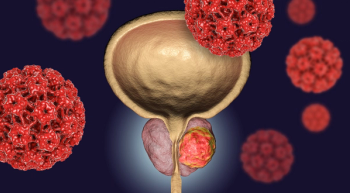
Patients with non-muscle invasive bladder cancer treated with the novel photodynamic therapy TLD-1433 experienced 6-, 12-, and 15-month complete response rates of 54%, 38%, and 37%, respectively.

Patients with non-muscle invasive bladder cancer treated with the novel photodynamic therapy TLD-1433 experienced 6-, 12-, and 15-month complete response rates of 54%, 38%, and 37%, respectively.

With pembrolizumab plus chemoradiotherapy now approved by the FDA for patients with advanced cervical cancer, one expert explained the importance of “making sure that patients know what to look for and what to report.”

Treatment with durvalumab, bevacizumab, and TACE improved PFS in embolization-eligible patients with unresectable hepatocellular carcinoma.

Treatment with regorafenib in patients with unresectable hepatocellular carcinoma and poor liver function may lead to serious side effects that may result in discontinuation of the treatment.

Neoadjuvant treatment with camrelizumab plus nab-paclitaxel and cisplatin improved pathologic complete responses compared with chemotherapy alone in patients with esophageal squamous cell carcinoma.

Patients with advanced hepatocellular carcinoma treated with frontline pembrolizumab plus lenvatinib showed a 3-year or more response among 35% of responders, although additional efficacy results from the trial are consistent with previous findings from the phase 3 LEAP-002 trial.

Patients with esophageal squamous cell carcinoma obtained significant survival improvements when treated with tiragolumab plus atezolizumab and chemotherapy compared with chemotherapy alone.

Erdafitinib was approved for the treatment of adults with locally advanced or metastatic urothelial carcinoma, which amends a previously approved indication of the drug.

Patients with resectable gastric and GEJ cancers, regardless of region, experienced an improved pathologic complete response to treatment with durvalumab plus neoadjuvant FLOT compared with chemotherapy alone.

Overall survival and progression-free survival improves with nivolumab plus chemotherapy compared with chemotherapy alone in the overall population and in patients with a PD-L1 CPS of 5 or greater.

Nivolumab plus chemotherapy enhanced overall survival and progression-free survival in patients with advanced or metastatic gastric cancer, gastroesophageal junction cancer, or esophageal adenocarcinoma.

Oncology nurses play a crucial role in educating patients regarding risks and benefits of circulating-tumor HPV DNA biomarker testing.

A fast track designation has been granted by the FDA to the novel BTK degrader, NX-5948, for adults with relapsed or refractory chronic lymphocytic leukemia or small lymphocytic lymphoma who were treated with at least two lines of therapy, including a BTK inhibitor and a BCL2 inhibitor.

Patients insured by Medicare can now receive coverage for lymphedema compression garments as a result of the Lymphedema Treatment Act, but it is essential that oncology nurses communicate this with their patients.

Treatment with asciminib for newly diagnosed, Philadelphia chromosome-positive chronic myeloid leukemia in chronic phase induced statistically significant and clinically meaningful major molecular response benefits compared with standard-of-care TKIs.

Treatment with pegylated liposomal doxorubicin and cyclophosphamide in the neoadjuvant setting, followed by a taxane, in addition to trastuzumab and pertuzumab, resulted in antitumor activity in patients with HER2-positive breast cancer.

The rate of initiating immunotherapy towards the end of life in patients with advanced cancers, including renal cell carcinoma, melanoma, and non-small cell lung cancer, is increasing over time.

Speaking with patients with cancer about financial toxicity, including available resources to help them pay for treatment and other necessities, can become a collaborative effort within an institution.

RC88, a mesothelin-targeting antibody-drug conjugate, was granted a fast track designation from the FDA for the treatment of platinum-resistant recurrent epithelial ovarian, fallopian tube, and primary peritoneal cancer.

A breakthrough therapy designation has been granted by the FDA to TAR-200 for the treatment of Bacillus Calmette-Guérin–unresponsive, high-risk non–muscle invasive bladder cancer who are not eligible for or opted not to receive radical cystectomy.

A new drug application for SH-105 has been accepted by the FDA to potentially treat patients with breast and ovarian cancer.

Pembrolizumab plus chemoradiotherapy has been approved by the FDA for the treatment of patients with FIGO 2014 stage III to IVA cervical cancer.

SLS009 has been granted fast track status from the FDA to be considered as a potential therapeutic option for relapsed or refractory acute myeloid leukemia.

A disease-free survival benefit continued with adjuvant pembrolizumab when compared with placebo in patients with resected early-stage NSCLC.

Oncology nurses can bring creative art to their pediatric patients with cancer, thereby potentially reducing their anxiety levels, research showed.

Three patients with resectable hepatocellular carcinoma experienced significant tumor necrosis greater than 70% after neoadjuvant treatment with low-dose stereotactic body radiation therapy and cemiplimab-rwlc, in addition to adjuvant cemiplimab.

Findings from the phase 3b LUMINANCE study aligned with safety and efficacy outcomes from the phase 3 CASPIAN trial, both of which focused on the administration of 5 or more cycles of induction platinum/etoposide alongside durvalumab for the treatment of patients with extensive-stage small cell lung cancer.

A supplemental biologics license application has been granted priority review by the FDA, which seeks a full approval of tisotumab vedotin for patients with recurrent or metastatic cervical cancer that progressed on or following frontline therapy.

A survival advantage via treatment with lenvatinib plus pembrolizumab was not seen when compared with docetaxel for advanced-stage non–small cell lung cancer whose disease progressed after previous exposure to a PD-L1 inhibitor and platinum-based chemotherapy.

Next-generation sequencing may better predict dMMR in patients with colorectal or endometrial cancer, highlighting the importance of the testing.